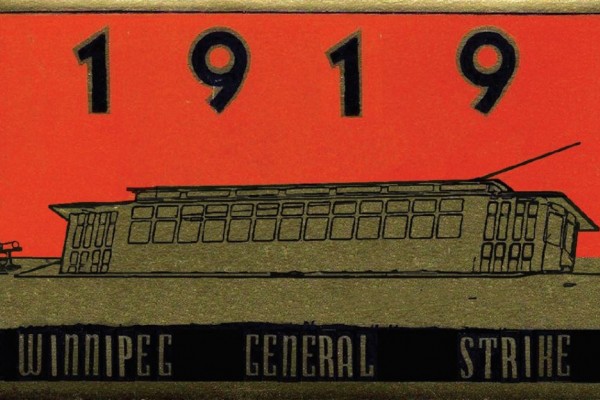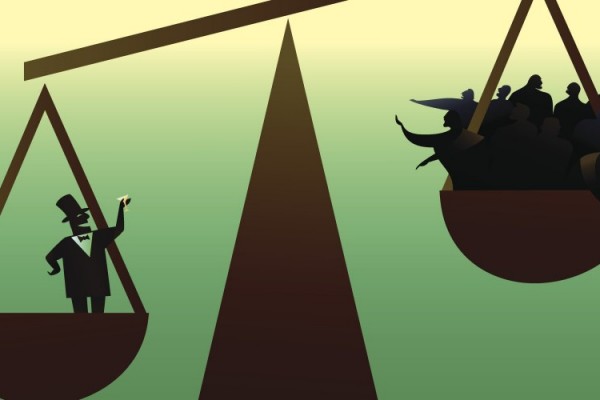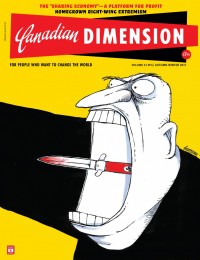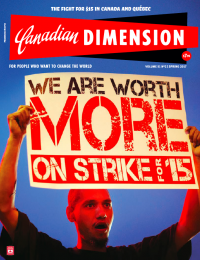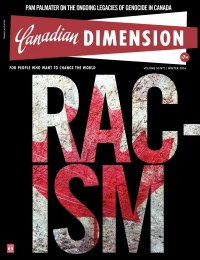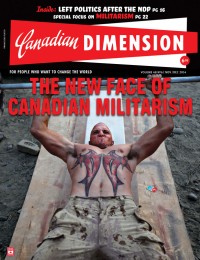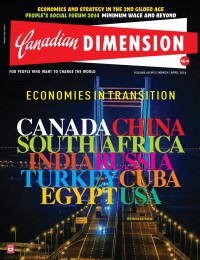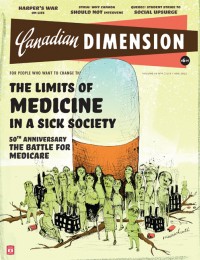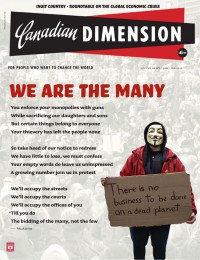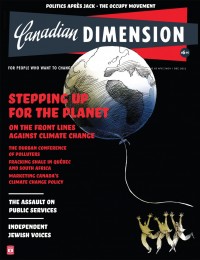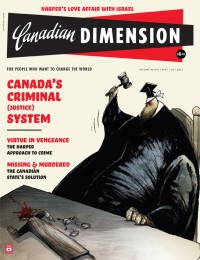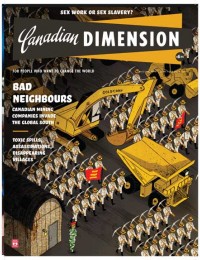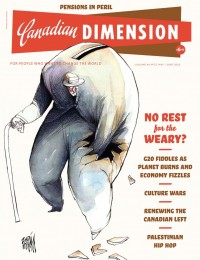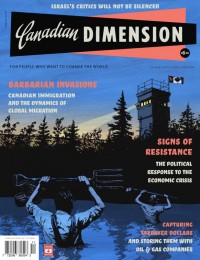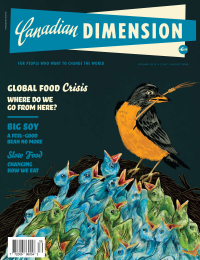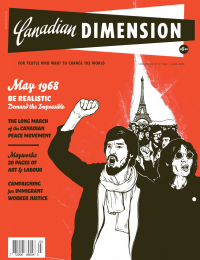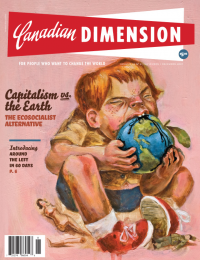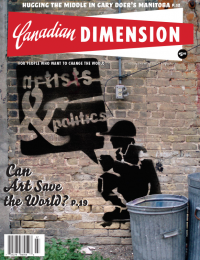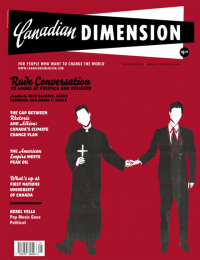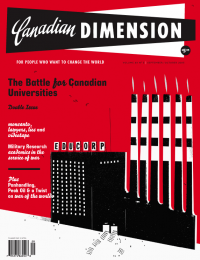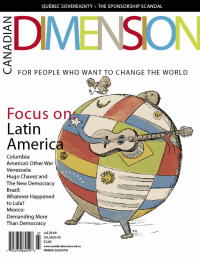Disaster capitalism at work in Manitoba

Manitoba Premier Brian Pallister at the 2017 Canada Summer Games. Photo from Flickr.
One misstep from disaster
While many will escape the worst health effects of the COVID-19 pandemic currently sweeping the country, a large number of Canadians will become casualties of the recession the virus has triggered. The job market is slowly being eaten away, and with it, wages and consumer power. A positive feedback loop of unemployment is likely if governments do not adopt new and radical measures to combat the unfolding recession.
A consumer debt bubble has accumulated over decades due to an explosion of cheap credit and unsustainable levels of debt. In late March, the Consumer Debt Index released a study that claimed over 50 percent of Canadians are $200 away from financial insolvency during the crisis. If this study is accurate, and our governments do not take proper steps to ameliorate, prevent or forgive insolvency, the largest economic collapse of the last century is but a few missed paycheques away.
The economic disaster on our doorstep is less about the pandemic than it is about the instability of capitalism and the inability of neoliberal governance to respond to crisis in an efficient and equitable fashion.
Manitoba is already receiving a glimpse of the austerity that many Canadians will likely have to face in the coming months. The Pallister government has shown itself to be incapable of moving beyond deficit reduction-obsessed politics and implementing a new economic model that prioritises mass prosperity over cutting and privatizing public services under the guise of the pandemic.
“Now is not the time for balancing budgets”
By March, Statistics Canada indicated that Manitoba had lost over 23,000 jobs, and on April 14, Premier Brian Pallister announced plans to claw back funding for “non-essential” public services. These proposed cuts will purportedly be around 10 percent and will likely produce significant job loss. The cuts will affect universities, crown corporations, non-profits, various social services and other publicly-funded organizations.
Few are really sure what Pallister means by “non-essential” services. According to union officials, the provincial government was unable to define what services they deem to be essential or not. It is probably safe to assume that many programs supplying crucial help to the most vulnerable will be negatively effected.
Although COVID-19 has put the brakes on the lives of many ordinary people, thousands still rely on crucial public services to navigate their increasingly precarious environments. Cuts will only make the situation less bearable for a significant portion of the population.
Beyond those who cannot navigate their situations without the help of crucial services, employees of these sectors are going to endure job loss and wage cuts. Although Pallister has said he will make public servants eligible for part-time work and EI, there is no indication from the federal government this will be permitted.
The premier has ultimately provided the public sector with two options: accept reduced pay and hours or be laid off. Nonetheless, the loss of wages from part-time work alone, will make the economic situation significantly more dire.
Manitoba Federation of Labour president, Kevin Rebeck, noted in an interview with the CBC that “local businesses are counting on people having money in their pocket to be able to keep their business afloat… lightening more wallets while families see their bills pile up certainly seems like it will add to the economic misery.”
Rebeck is rightly concerned with the very real possibility of an economic downturn if the government chooses to apply austerity measures over stimulus and job creation programs that ensure financial security. Pallister, on the other hand, actually views these cuts to the public sector as an “act of solidarity” with many of the private sector workers who have been laid off due to the virus. In a recent press conference, he claimed, “this will also allow our non-frontline public servants to demonstrate their solidarity with their frontline colleagues and with their private sector brothers and sister too… who are losing much much more.”
Unfortunately, what Pallister’s government clearly does not see is that the wages of public workers prop up the same private sector he wishes to expand. Undermining this labour pool would simultaneously undermine the entire economy.
When the premier addressed the province on April 14, he said that unless unions accept the terms of his planned cuts to public services, they are doing a disservice to front-line workers. In line with this type of reasoning it would appear to be political suicide if unions were to refuse his measures.
Canadian Dimension spoke with a non-profit worker in Winnipeg who commented on Pallister’s agenda of fiscal austerity:
The social service sector in many ways runs parallel to health care. A lot of social services and clinics offer things like mental health resources and other crucial services. Public sector workers that continue to provide essential services, are not neglecting the safety of healthcare workers. We are just as supportive of a good healthcare system, if not more, than Brian Pallister.
Now is not the time to be balancing budgets and relying on free market solutions to dig Manitoba out of this crisis. New and innovative measures must be taken to expand the public sector, and with it, the health care system. This means simultaneously expanding the deficit.
Deficit spending does not necessarily mean economic turmoil. If public funds are spent on long-term, productive measures that keep people employed while addressing social needs and other inequities, the economy will recover.
Social issues, poverty and unemployment place enormous strain on provincial budgets. As a result, refusing to spend only produces the conditions which force spending later. If money is invested in social infrastructure and programs now, the fallout from COVID-19 could be cushioned.
“Now is the time to invest in Manitoba’s public and social services, workers, communities, and small businesses — not the time to abandon them,” reads a news release published recently by the National Union of Public and General Employees. Photo of the Manitoba Legislature by Kevin M Klerks/Flickr.
What is this really about?
Pallister has declared a four-month buffer period for the cuts, but many believe they will remain long after the crisis has ended and may even intensify later on. In the words of Wab Kinew, leader of Manitoba’s NDP, “I don’t think anybody expects Pallister to cut a job and then bring it back in the future.”
Considering Manitoba’s deficit is expected to grow to $5 billion during the pandemic, it would not be a stretch to see the Conservative government take extreme action to re-gain lost ground.
As the infamous University of Chicago economist Milton Freidman wrote, “only a crisis–actual or perceived–produces real change. When that crisis occurs, the actions that are taken depend on the ideas lying around.” Progressive author and commentator Naomi Klein has warned against the powers of elites to profit from crisis and push forward ‘shock doctrine’ policies which, under regular circumstances, would be exceedingly difficult.
In an interview with a service provider employed in the non-profit sector, Canadian Dimension asked what the aftermath of the crisis will mean for the public sector. She expressed anxiety about Pallister’s tendency towards austerity:
He doesn’t care about non-profits. He doesn’t care about social issues. If we let this happen it will remain. I think this is a way of getting what he’s wanted for a long time and it’s a dangerous thing to believe that it’s only going to last for four months… social services will be cut drastically. If we think that pressing issues such as gender-based violence, family violence, poverty, addiction is bad as is, it’s going to get much worse if people can’t access resources. With budget cuts and shutting down organizations that are doing essential frontline work for these issues during the pandemic, it’s going to completely expedite everything Manitoba is dealing with right now. We’re not going to be dealing with exclusively a financial deficit, it’s going to be socially crippling as well. The issues that were there before the pandemic are still here during the pandemic and if we cut resources now, they are going to be considerably worse after.
Jaqueline Romanow, President of the University of Winnipeg Faculty Association has described Pallister’s agenda as “disturbing.” The President of the University of Manitoba’s Faculty Association, Janet Morrill, reiterated this stance noting, “this is not the time to balance budgets on the back of institutions which are going to be essential for getting [us] out of this.”
The Manitoba Organization of Faculty Associations also indicated that they reject Pallister’s austerity agenda, asserting, “Mr. Pallister himself admitted that cuts to the public sector would cover only a dime of every dollar of deficit financing needed to see Manitoba through the crisis. That level of saving is not worth gutting institutions that are an essential part of the economy and social fabric of Manitoba.” The funding cuts indicate, more than anything, an abuse of political power during a perilous crisis when the public is immobilized.
Manitobans must hold the Pallister government to account and prevent it from capitalizing on the anxiety produced by the pandemic to benefit his austerity agenda. Sacrifice, after all, is the rhetoric of the powerful.
We are living in unprecedented times that will either leave a stain on our memories or produce a new, more equitable world. Although Milton Friedman’s economic ideas have been thoroughly debunked, he was certainly right about one thing: only a crisis produces real change.
It is up to working people to stand up to the powerful and ensure the change that occurs will contribute to a better outcome for all. Either way, after COVID-19, nothing will be the same.
Lucas Edmond is enrolled in his fourth year at the University of Manitoba completing a double honours degree in History and Anthropology. He has specialized interests in economic and social history and critical political ecology.





